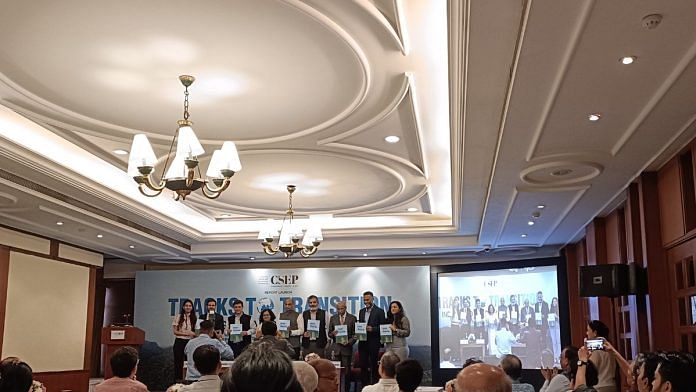New Delhi: India is everywhere when it comes to climate diplomacy. From bilateral negotiations to COPs and multilateral forums to independent alliances for carbon transition, there’s no ignoring New Delhi’s growing influence. That was the general consensus during the launch of a new report, Tracks to Transition: India’s Global Climate Strategy, by the Centre for Social and Economic Progress.
One of the editors of the report, Constantine Xavier, recounted how his former professor would say, “India just cannot say yes on the global platform.” But in 10 years, that perception has changed. Today, India’s climate diplomacy is marked by its transformation from a country that ‘can’t say yes’ to one that ‘can’t say no.’
As a foreign policy researcher, this piqued Xavier’s interest in India’s global climate negotiations. He and non-resident CSEP fellow Karthik Nachiappan envisioned and then edited the report, which analyses India’s foreign policy concerning climate change. The report features commentaries and case studies, and was recently unveiled to a packed room at Delhi’s India Habitat Centre.
The authors examine initiatives such as the Trilateral Development Partnership that India signed with the US in 2016 to increase climate-smart agriculture and renewable energy in Africa and Asia. The report also provides perspectives on how India engaged with the European Union on clean energy technologies, which is highlighted in the European Investment Bank (EIB)’s 2023 plan to funnel €1 billion into the India Hydrogen Alliance for green hydrogen projects.
Also read:
Was India a climate policy obstacle?
But during the panel discussion that followed, former foreign secretary Shyam Saran countered India’s reputation as a naysayer. Saran also served as the Special Envoy for Climate Change under Prime Minister Manmohan Singh. He contended that the portrayal of India as a ‘roadblock’ to global climate policies at the time was “carefully curated and untrue.”
“Our actions were not to obstruct negotiations but to remind developed countries not to back off from their promises,” said Saran.
Centre for Policy Research professor and panel member Navroz Dubash explored all that has changed since Saran’s tenure. The answer, he said, lies in the “articulation of India’s interests”.
He praised the report for outlining how India’s initiatives have extended beyond the United Nations Framework on Climate Change to include other multi-party initiatives like the Quad alliance and organisations such as the International Energy Agency.
But Dubash also warned against perceiving climate change as a mere intergovernmental issue.
“We should look at climate change as an issue of global governance, where the domestic processes within countries shape their climate strategy at the global level.”
Also read:
The politics of climate negotiation
Addressing the gathering virtually, Adrienne Abdenur, special advisor to the Presidency of Brazil, spoke about BASIC countries — Brazil, South Africa, India, and China – and the need for them to join forces for climate change mitigation.
Emphasising India’s goal of net-zero carbon emissions by 2070, Abdenur said India and Brazil have converged on the emissions front. As emerging economies, they understand the importance of “common but differentiated responsibilities”.
The panel, well-versed in both climate issues and foreign policy, soon started to discuss the CSEP report’s recommendations on enhancing climate governance. One of these recommendations was about increasing the external affairs ministry’s participation in climate change-related initiatives.
“At the end of the day, every climate negotiation is an intensely political negotiation and needs to be dealt with as such,” said Saran.
But it was panellist Dhanashree Jayaram, a professor of geopolitics and international relations at Manipal Academy of Higher Education, Karnataka, who reminded everyone that climate strategy no longer rests purely on national actors like India or China. Indian cities and states also contribute to climate and pollution action plans.
The fraught geopolitical landscape highlighted in this report is not really a new phenomenon. “For as long as I can remember, we have had turbulence in geopolitics,” Jayaram said. The important thing to remember, she added, is that it does not always obstruct climate change action.
“Geopolitics is and always has been embedded within climate change, so we cannot treat the two as separate.”
(Edited by Zoya Bhatti)



